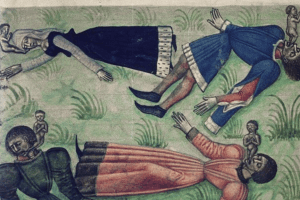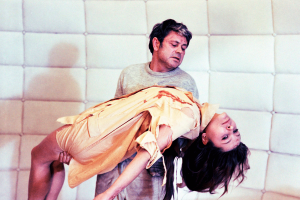September is here, spring is around the corner, and porteños begin to feel the gentle heat that announces the end of the year. We take to parks and squares, exorcise the cold of winter, and line up the ideas, documents, and bills that will make up our annual balance. Yes, this might sound like an exercise in accounting, but it achieves, in a ritual and bureaucratic way, the aim of any narrative: to find a meaningful ending. With the annual balance as an excuse, we will write about Las tres vanguardias: Saer, Puig, Walsh, a book that belongs among the most outstanding publications of 2016 in Argentina. Published by Eterna Cadencia, Las tres vanguardias compiles eleven classes offered by writer Ricardo Piglia between September—oh, what a coincidence—and December of 1990 at the Faculty of Philosophy and Literature of the University of Buenos Aires.
The late publication of these transcriptions, made by two students at Piglia’s own request, allows us to renew the debate about some territories and tensions of Argentine literature, which is a way of speaking about world literature and also, why not, of non-literary Argentina. To begin, it is easy to draw a parallel between the time of the seminar—the first year of Carlos Menem’s presidency—and the present time: the process led by Mauricio Macri, with ten scarce months in power. Both political projects hold clear coincidences, such as an opening to the free market and the drawing of an international alignment opposed to the traditions of the left and of Peronism –at least of classical Peronism. They are also parallel moments in terms of denial. In the 1990s, the Berlin Wall had fallen and the illusion of collectivism collapsed; what is crumbling now, as sustained from this discursive construction, is the Latin American populist narrative.
This parallelism may perfectly well be dispensed with in order to read Piglia’s classes. Nevertheless, I think that Piglia chose a subject for his seminar that is indeed very political, in the urgent sense of policy and not in the sense of theory. Keeping the parallelism, that urgency easily reincarnates in much of the field of the now-political opposition in Argentina. Piglia chose to speak of avant-gardes when the word itself was being highly discredited, at the height of the supposed end not just of the avant-gardes, but also of history itself. It seems almost like a scheme of reorganization in the midst of disbandment, not in terms of phalanx but regarding the possibility of choosing and rearranging tensions. Because for Piglia, the avant-garde is connected with its origins in military lingo: it is the deployment of each writer’s literary ammo, language, poetics, and plots against other writers and machineries. The survival or oblivion of a work is at play in the struggle of a tradition against another tradition, he says. This is a discourse of conflict in an age that denies conflict because it postulates an idyllic, massive individual realization, deeply rooted in liberal thought and its common sense.
In order to propose a debate on the poetics of Argentine literature, Piglia chooses three writers subsequent to Borges: Juan José Saer, Manuel Puig, and Rodolfo Walsh. These three writers are not only prestigious but are still widely read, which could not have been foreseen back in the nineties; this speaks of the talent of each one of them and, especially, of how they made their works play with reality. Piglia is interested in these three authors because they face the crisis of the novel as a narrative form. In the 20th century, the novel went from being a privileged medium in the construction of an aesthetic and a sense of the new society (for example Balzac) to being displaced from that role by mass media, especially the newspapers and the cinema. According to Piglia, the resolution of this crisis in Argentine literature was a common and simultaneous search with the rest of world literature, or at least with the great centers of Western culture.
In this context, Piglia argues that there is no longer an asynchrony between Argentine literature and world literature, and that this is part of Borges’s legacy—among others, but especially Borges—. From the orphanhood of our literature and our pampa, from its marginality, a tradition could only be found in world literature. From there, a literature was born of readings and rereadings, book-abundant like Buenos Aires, which boasts the most bookstores per inhabitant in the world, a truly incredible feat. «It is necessary to start reading the tradition of writers’ readings in the same place where the great traditions of criticism and literary debates are read,» Piglia proposes. For him, every writer is a reader, even those who do not subscribe to such a statement.
Amidst the crisis of the novel, we argued, these three writers chose to generate a new reader and discarded the option of disputing the mass media audience from the plainness or narrative lightness of bestsellers or genre literature. They proposed to work «the internal poetics from which the text was written. This means asking who was battled during the writing,» knowing that in the creation of this poetics «we try to construct a reading as a space in which the texts will be written or are being written can function.» Thus, it is clear that the avant-garde Piglia speaks of is not that of a group fighting for the new, as defined by Beatriz Sarlo in Proa and by the magazines of the 20s; it is not the formalist or leftist disruptive avant-garde, either. The avant-garde must be discovered within language: «We will regard the avant-garde as a social realization of the writer’s reading, a socialization of the struggle between poetics.»
The development of the seminar was based on these three or four definitions. We will not continue to replicate what is best explained in the book, so to close this review we will reference another of the topics addressed, which is the tension between literature and reality. These three writers lived in an Argentina marked by the revolutionary struggles of the sixties and seventies, in an atmosphere of extreme politicization. For Piglia, they, therefore, express three different ways of dealing with that tension. Juan José Saer opposes pause to velocity, the moment against the rhythm of the machine; his is a poetic density that slows and locks language against the cannibalistic vertigo of journalistic prose—a subversive and difficult project, today even more than then—. In contrast, Puig metabolizes in the novel the voices of mass media, especially cinema, exposing political tension, attraction, and rejection, between art and reality, without ever solving it or taking sides. El beso de la mujer araña is the most eloquent example: a novel that is a dialogue between a political prisoner and a homosexual common prisoner, where eroticism, betrayals, and loyalties slip. To finalize this somewhat brutal synthesis we must approach Rodolfo Walsh, an emblem of the revolutionary writer, a Montoneros intelligence chief, desaparecido (disappeared) of the dictatorship. In Walsh, the relationship between political reality and writing is dissolved without socialist realism or similarly detestable transactions. Walsh the writer disappears as Walsh the revolutionary becomes professionalized. The journalist, the polemicist remains, but the novel ceases to be an option. There is no coexistence. In this metamorphosis, he produces Operación Masacre and ¿Quién mató a Rosendo?, books that incorporate marginalized voices and reveal, to literature and to society, the censored truth of political violence. Walsh’s books escape fiction to unfold within social struggle.
Which traditions uphold these positions? In Saer, the canonization of Entre Ríos poet Juan L. Órtiz, the poet in his island. The entertainment industry and mass media are the substrate of Puig’s work. The nationalist essayist, English literature, the police genre, and Hemingway help to better read Walsh. Throughout the eleven classes, Piglia establishes the points and crosses between these different moments of Argentine literature and the bridges that regroup these writers with international tendencies, political processes, and technological developments.
Here ends our review.
The topics covered may be useful to reflect on the current situation of Argentine literature. In two and a half decades we moved from neoliberal postmodernity to social outbursts, we returned to a Peronist populist version with its modernist discourse of industrialization, to come back once again to the resurrection of the free market. In conclusion: we are not in the same place, but did we get very far? In the strictly literary realm, quite some water has flown under the bridge, but how and how much has the social and productive structure changed?
The topics covered may be useful to reflect on the current situation of Argentine literature. In two and a half decades we moved from neoliberal postmodernity to social outbursts, we returned to a Peronist populist version with its modernist discourse of industrialization, to come back once again to the resurrection of the free market. In conclusion: we are not in the same place, but did we get very far? In the strictly literary realm, quite some water has flown under the bridge, but how and how much has the social and productive structure changed?
The digital revolution—the heart of our era—has not created any particularly interesting narrative genre, but it has multiplied channels of circulation and shaped a new reader: the hyperbolic version of Witold Gombrowicz’s distracted reader. These are people who might leave a tweet half-read out of laziness and anxiety. Due to the proliferation of platforms, the simplification of printing processes, and the commercial protectionism of Kirchner’s last years, publishing possibilities increased—so much so, that it would be practically impossible to keep track of all independent publishers and their releases, at least in Buenos Aires—. Meanwhile, systems of reference and validation have not worked, or at least have proved deficient or outdated, to mediate between all this production and a new readership.
A few months ago, I read a story about a Catalan man who was about to finalize his publication plan for a tweeted version of El Quijote. He spent who knows how many years uploading a tweet a day, with a stated pedagogical goal. The idea of molding the density of literature to social networks seems absurd because of its inherent desperation, but it does say something about a concern: how to win over the readers who spend at least seven hours a day in front of a computer screen. Again, the question arises as to whether those readers must be won over or if we should create new ones that we can demand other times from. We wonder if literature has the potential to compete with the short forms of networked communications, or if we must abandon that arena altogether and circulate precisely what constitutes its capital thus far: an intellectual density that no other discipline can offer. Should social networks be incorporated into literature, albeit in a crude way? Or must we continue thinking about how literature might intervene in reality?
To think about the information revolution, unless there is some candid confusion involved, leads us back to the question of territory. For instance, over the last decade, North American cinema has created the epic of computer science, which moves away from the classical paradigm of science fiction in which the machine threatens human life. Movies like The Social Network, The Imitation Game, and Jobs, have made this transit. This epic would be impossible in Argentine cinema, where such materiality does not exist; there, a more sensitive approach should resemble Dos disparos, the film by director and writer Martín Rejtman, in which a series of exorbitant characters are delicately linked to each other, with the moving and elemental potency of the search for love and friendship. They are centerless characters because their center is elsewhere, in a place where the epic is possible—that is, the conquest of the impossible under a benevolent vision or the colonization through the eyes of the resistance—. If, in the literary realm, we had become in sync with the rest of the world through Borges’s operation in El escritor argentino y la tradición, the information revolution drags all users to a peripheral situation, without the possibility to reverse this to an advantageous position. An object has no room to maneuver, and we are what the Internet sells: the Google product is you.
Thus the tension between writing and politics again appears irreducible. Borges emancipated the Argentine writer from the state and proposed world literature as their heritage. Juan José Saer wrote, many years later, an article that takes the crisis of 2001 as starting point. Without denying the founding contribution of Borges, Saer adds that there is a thread running through the vigorous national tradition, and that is political violence, since El matadero by Esteban Echeverría onwards. «The Argentine writers (as all the others, probably) were forced to live in a country agitated by endless conflicts. And today, those who ventured into the jungle of those conflicts and were able to forge their own tradition from them, remain legible.» Saer’s idea can be rephrased by asking whether the political violence disappeared, whether it is latent, whether it mutated into narcotic forms, or whether we have finally achieved well-being and democratic coexistence in the Republic of Argentina.
In any case, each writer must choose against what or whom to write, what readers to seek, and what poetics and from what territory. The Argentine universality has been appropriated by many Latin American writers, from Cabrujas, who reformulated it in his Caracas vision, to Roberto Bolaño, who had abolished all his nationalities to present himself simply as a Latin American writer—which seems to me, in view of many of his stories and lectures, a modest and, let us say, particular, way of subscribing to the Borges tradition.
I meant to end this by stating that Argentine literature had not appropriated the rich and interesting Latin American literary diversity to the extent that its postulated universality would have allowed, though I think perhaps it does not matter anymore. Perhaps what literature should propose itself from this periphery is the impossible: a counter-epic, something I heard Enrique Symns say (quote) on a winter afternoon to a group of students gathered around him in an old house in Palermo.
The task of the artist will be to unplug man from machine.
*About the author:
Juan Manuel Suppa Altman (Buenos Aires, 1980) is a lawyer and journalist. He has written for different print media such as Time Out, Planeta Joy, Tiempo Argentino and Buenos Aires Económico. He created and directed the online art and urban culture platform Revista Óvnibus, which brought together writers from more than 15 Latin American cities from 2010 to 2014. He currently coordinates the «History of drug prohibition» section of THC Magazine.

















